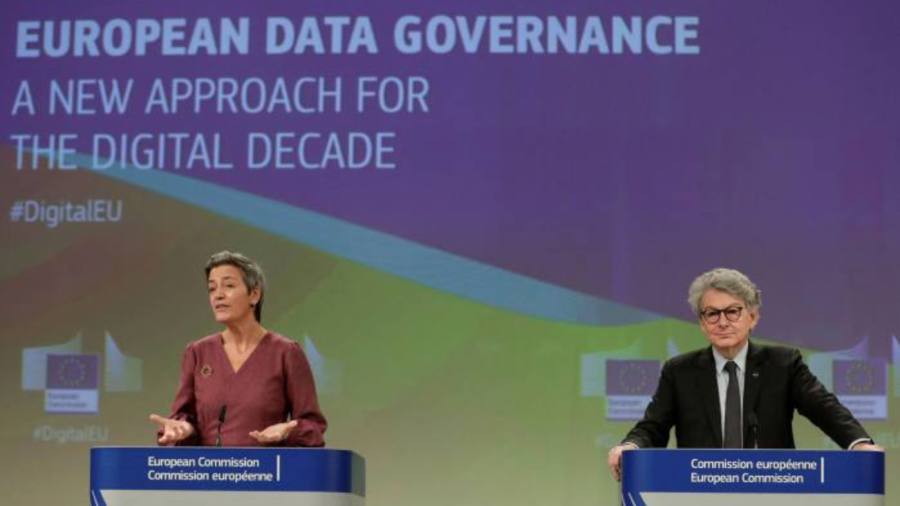The EU will threaten on Tuesday to break up Big Tech companies if they repeatedly engage in anti-competitive behaviour.
The warning comes as Brussels publishes its drafts of two major new pieces of tech regulation.
A Digital Markets Act will aim to tackle unfair competition in the sector, and a Digital Services Act will force tech companies to take more responsibility for illegal behaviour on their platforms.
The long-awaited regulations are the first significant overhaul of the EU’s approach to the internet for two decades.
After the European Commission publishes its proposals on Tuesday, they will be voted on by the European parliament and there is no timetable yet for when they will come into force.
Both of the regulations carry huge fines for bad behaviour. Big Tech companies that deliberately break new competition rules will be liable for fines of up to 10 per cent of their global revenues. Big Tech companies that do not police their platforms will be liable for fines of up to 6 per cent of their global revenues.
But the draft of the Digital Markets Act also states that Big Tech companies that are fined three times within five years will be labelled as repeat offenders and the EU will move to structurally separate their businesses, according to two people with direct knowledge of the plans.
If an investigation shows systematic bad behaviour that further strengthens a company’s position, the EU may impose “any behavioural or structural remedies which are proportionate to the infringement committed and necessary to ensure compliance,” a draft of the regulation said.
The new rules, if they pass into law in their current form, would represent one of the most stringent set of regulations on Big Tech in the world.
They are also an acknowledgment that existing competition law is inadequate and too slow-moving in the digital age, and has failed to curb the rapid ascent and huge market power of the Silicon Valley giants.
Companies such as Google, Amazon, Facebook and Apple are also facing growing hostility in Europe for paying low levels of local tax, invading privacy and crushing their rivals.
Thierry Breton, the EU’s commissioner for the internal market who is co-leading the overhaul of the digital rules, told the Financial Times in September: “There is a feeling from end users of these platforms that they are too big to care.”
Margrethe Vestager, the EU’s executive vice-president in charge of competition and digital policy, also recently expressed her frustration of how antitrust probes have not tamed Big Tech.
“It is painful that in digital markets the harm that can be done in that marketplace can happen very fast but the recovery of that marketplace can be very, very difficult,” she recently told the Financial Times.
As it publishes its draft regulations, the EU will also set out how it aims to assess which companies are “gatekeepers”, which dictate the rules of the marketplace. The criteria will include a company’s global turnover over the past three years, its number of users, and its market capitalisation over the past year.
EU officials said a company’s market cap was an important metric since it determined a company’s ability to raise money quickly to acquire potential rivals.
However, Brussels’ ambition to take on Big Tech faces at least two years or more of political wrangling and debates in the European parliament and the council of ministers.
Paul Tang, a Dutch socialist MEP who will be taking active part in the discussion of the new rules next year, said: “The commission’s plans are good, but not good enough to curb the monopoly power of tech giants.
“Instead, the commission should take direct aim and at least dismantle the perverse business model of these tech giants: monetising personal data via advertising.”
Others in the European Parliament expect Big Tech will try to water down the new rules. Stéphanie Yon-Courtin, another European lawmaker who has played a prominent role in competition policy discussions, said: “I expect platforms to try to divide the EP around fake and simple debates such as being pro versus anti freedom of speech or pro and versus anti innovation.”

















